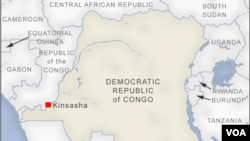Inter-ethnic clashes in Democratic Republic of Congo have sent some 16,000 refugees fleeing for their lives into neighboring Congo-Brazzaville, the U.N. refugee agency reports.
The largely dormant, long-standing rivalry between the Banunu and Batende communities in Mai-Ndombe province in the western DRC erupted with deadly force Dec. 29, 2018.
The dispute reportedly has killed dozens, with around 150 injured among those fleeing across the border in the largest influx of refugees from the DRC into the neighboring Republic of Congo, or Congo-Brazzaville, in almost a decade.
The newly arriving refugees, mostly women and children of the Banunu tribe, say their homes were attacked and burned, people were killed, and they fled because they feared the fighting would escalate.
The Republic of Congo currently is hosting about 60,000 refugees, mainly from Central African Republic, DRC, and Rwanda.
UNHCR spokesman Andrej Mahecic tells VOA this large influx of refugees into the country in a matter of days is a major event that requires a major response.
"The area of the Congo-Brazzaville where these people are is very remote," Mahecic said. "It is not easy to reach. … The refugees who are there are living in extremely difficult conditions in the remote areas where the communities are actually struggling to access water, food and health care."
Mahecic says UNHCR is working with the World Food Program and other agencies to distribute food, shelter materials and other basic relief items. He says conditions for the refugees are likely to get worse because of the rainy season and floods in the area.
In addition, he warns, the newly-arrived refugees are exposed to malaria and water-borne diseases. Getting aid to them will be difficult because of the remoteness of the area, with some localities only accessible by the river.




